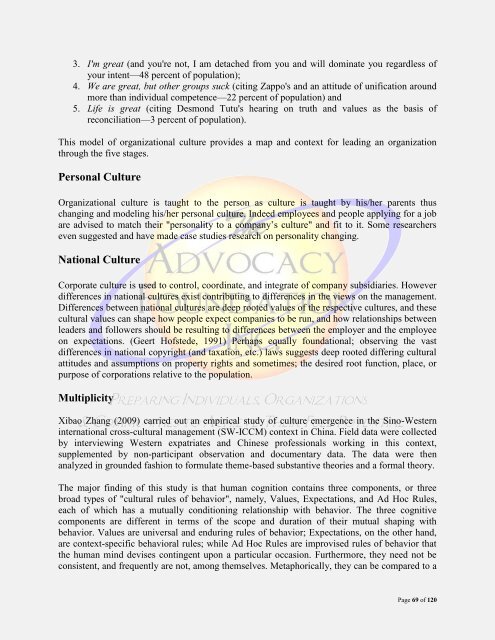Organizational Development - Vol. V, Part II
Organizational Development - Vol. V, Part II
Organizational Development - Vol. V, Part II
Create successful ePaper yourself
Turn your PDF publications into a flip-book with our unique Google optimized e-Paper software.
3. I'm great (and you're not, I am detached from you and will dominate you regardless of<br />
your intent—48 percent of population);<br />
4. We are great, but other groups suck (citing Zappo's and an attitude of unification around<br />
more than individual competence—22 percent of population) and<br />
5. Life is great (citing Desmond Tutu's hearing on truth and values as the basis of<br />
reconciliation—3 percent of population).<br />
This model of organizational culture provides a map and context for leading an organization<br />
through the five stages.<br />
Personal Culture<br />
<strong>Organizational</strong> culture is taught to the person as culture is taught by his/her parents thus<br />
changing and modeling his/her personal culture. Indeed employees and people applying for a job<br />
are advised to match their "personality to a company‘s culture" and fit to it. Some researchers<br />
even suggested and have made case studies research on personality changing.<br />
National Culture<br />
Corporate culture is used to control, coordinate, and integrate of company subsidiaries. However<br />
differences in national cultures exist contributing to differences in the views on the management.<br />
Differences between national cultures are deep rooted values of the respective cultures, and these<br />
cultural values can shape how people expect companies to be run, and how relationships between<br />
leaders and followers should be resulting to differences between the employer and the employee<br />
on expectations. (Geert Hofstede, 1991) Perhaps equally foundational; observing the vast<br />
differences in national copyright (and taxation, etc.) laws suggests deep rooted differing cultural<br />
attitudes and assumptions on property rights and sometimes; the desired root function, place, or<br />
purpose of corporations relative to the population.<br />
Multiplicity<br />
Xibao Zhang (2009) carried out an empirical study of culture emergence in the Sino-Western<br />
international cross-cultural management (SW-ICCM) context in China. Field data were collected<br />
by interviewing Western expatriates and Chinese professionals working in this context,<br />
supplemented by non-participant observation and documentary data. The data were then<br />
analyzed in grounded fashion to formulate theme-based substantive theories and a formal theory.<br />
The major finding of this study is that human cognition contains three components, or three<br />
broad types of "cultural rules of behavior", namely, Values, Expectations, and Ad Hoc Rules,<br />
each of which has a mutually conditioning relationship with behavior. The three cognitive<br />
components are different in terms of the scope and duration of their mutual shaping with<br />
behavior. Values are universal and enduring rules of behavior; Expectations, on the other hand,<br />
are context-specific behavioral rules; while Ad Hoc Rules are improvised rules of behavior that<br />
the human mind devises contingent upon a particular occasion. Furthermore, they need not be<br />
consistent, and frequently are not, among themselves. Metaphorically, they can be compared to a<br />
Page 69 of 120

















